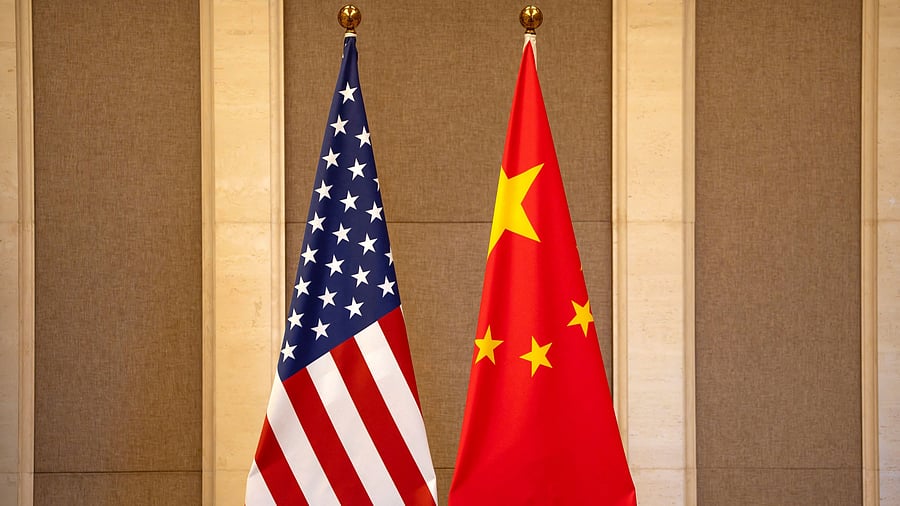
File photo showing the flags of US and China.
Credit: Reuters Photo
By Katia Dmitrieva
China’s defiant stance in negotiating a tariff truce with the US has convinced some countries they need to take a tougher position in their own trade talks with the Trump administration.
The pause reached a week ago gave structure to what promise to be prolonged and difficult rounds of talks between Washington and Beijing, which still faces average US import taxes near 50% when past levies are factored into the 30 per cent rate agreed to in Geneva, Switzerland.
Yet US President Donald Trump’s willingness to retreat so much from the earlier 145 per cent duty on China surprised governments from Seoul to Brussels that have so far stuck with the US’s request to negotiate rather than retaliate against its tariffs.
After China’s tough negotiating tactics earned it a favorable — albeit temporary — deal, nations taking a more diplomatic and expedited approach are questioning whether that’s the right path.
“This shifts the negotiating dynamic,” said Stephen Olson, a former US trade negotiator who’s now a visiting senior fellow with ISEAS — Yusof Ishak Institute in Singapore. “Many countries will look at the outcome of the Geneva negotiations and conclude that Trump has begun to realize that he has overplayed his hand.”
Left for now at 10 per cent, the higher bespoke rates will kick in unless deals are signed or postponements are granted before a 90-day suspension ends in July.
While officials are loathe to signal publicly any hardening of their approach, there are signs particularly from larger nations that they’re realizing they hold more cards than previously thought and can afford to slow the pace of negotiations.
Trump himself indicated last week — near the halfway point of the 90-day reprieve — that there isn’t time to do deals with about 150 countries lining up for them. So the US may assign the higher tariff rates unilaterally in the next two to three weeks.
While Trump also said that India was prepared to lower all tariffs on US goods, the nation’s External Affairs Minister Subrahmanyam Jaishankar told reporters that trade talks are ongoing and “any judgment on it would be premature.”
India’s Commerce Minister Piyush Goyal was scheduled to arrive in the US this weekend for further negotiations.
“There are many countries that may learn from China that the correct way to negotiate with President Trump is to stand firm, remain calm and force him to capitulate,” said Marko Papic, chief strategist of GeoMacro at BCA Research.
Japan’s Rethink
Japanese trade officials are scheduled to visit Washington this week. Japan’s Trade Minister Yoji Muto skipped a regional meeting last week in nearby South Korea that US Trade Representative Jamieson Greer attended.
Top negotiator Ryosei Akazawa, who leads Japan’s tariff task force, said earlier this month that he is hoping to reach an accord with the US in June, but recent local media reports indicate an agreement is more likely be reached in July, ahead of an upper house election.
Policymakers in Tokyo may be starting to think that it’s preferable to take time rather than make major concessions to wrap up things up quickly.
“Everyone in the queue is wondering, ‘Well, why have I been lining up?’” said Alicia Garcia Herrero, chief economist for Asia Pacific at Natixis. “This deal let China jump the queue and also doesn’t have clear benefits for the US so it’s doubly painful for other countries watching.”
Even US officials are signaling that negotiations will take longer. Commerce Secretary Howard Lutnick told Bloomberg TV that talks with Japan and South Korea will take time. Treasury Secretary Scott Bessent last week said the European Union suffered from a lack of unity that was impeding talks.
“I think the US and Europe may be a bit slower,” Bessent said Tuesday at a Saudi-US Investment Forum in Riyadh.
On Sunday, the Treasury secretary sounded optimistic about talks more broadly, adding that “we didn’t get here overnight.”
“With a few exceptions, the countries are coming with very good proposals for us,” Bessent said in an interview on CNN’s State of the Union. “They want to lower their tariffs, they want to lower their non-tariff barriers, some of them have been manipulating their currency, they’ve been subsidizing industry and labor.”
EU Skepticism
Officials in Brussels viewed the US-China tariff announcement as leaving high tariffs in place and limited on several fronts, according to people familiar with EU discussions.
The meager negotiating gains for the US and the lack of a clear end game during the 90-day reprieve show how limited is Trump’s appetite to keep ratcheting up the pressure on Beijing, the people said on condition of anonymity to discuss private deliberations.